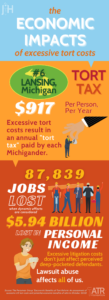HIGH COURT EXPANDS LIABILITY FOR BUSINESS
Premises Liability
 In a case with significant implications for property owners and insurers in Michigan, the Michigan Supreme Court overturned a long-standing framework for deciding slip-and- fall cases. The decision arose in a case in which a person sued after slipping on ice while walking from her car into a gas station. The gas station moved to dismiss the lawsuit on the ground that, under Michigan law, a property owner owes no duty to protect invitees from dangers that are “open and obvious.”
In a case with significant implications for property owners and insurers in Michigan, the Michigan Supreme Court overturned a long-standing framework for deciding slip-and- fall cases. The decision arose in a case in which a person sued after slipping on ice while walking from her car into a gas station. The gas station moved to dismiss the lawsuit on the ground that, under Michigan law, a property owner owes no duty to protect invitees from dangers that are “open and obvious.”
The open-and-obvious doctrine long has been an important resource for property owners in the state and most recently was applied by the Michigan Supreme Court in 2001. In the recent lawsuit, however, the plaintiff argued on appeal that the open-and-obvious doctrine was inconsistent with Michigan’s adoption of comparative negligence, since this framework does not bar recovery when a plaintiff’s own negligence contributes to their injury.
In Kandil-Elsayed v. F&E Oil, Inc., the Michigan Supreme Court overruled precedent, holding that landowners, in all instances, possess a duty to exercise “reasonable care to protect invitees from an unreasonable risk of harm caused by a dangerous condition of the land.” Despite the obvious nature of the hazard, a landowner still has a duty to protect visitors.
Justice David Viviano, in a thorough dissent, criticized the majority’s departure from decades of precedent. In his view, the open-and-obvious doctrine reflects the “straightforward notion” that property owners owe no duty to protect others from hazards that are both clearly visible and avoidable. The dissent expresses concern that the majority’s ruling will create uncertainty among business and homeowners, alike, who may be “faced with the increased threat of liability.” The dissent argued that few recent court decisions have the potential to “wreak such havoc” as this one.
As a result, Michigan courts are expected to see a wave of slip-and-fall cases in the coming months. The shift in law will require many more cases to be decided by juries rather than the court, which will lead to more expensive and time-consuming litigation. One Michigan defense lawyer stated that the court’s decision appears to turn the open-and-obvious doctrine “from a shield for the defense to a sword for the plaintiff.”
Workplace Liability
In July 2023, the Michigan Supreme Court overturned yet another precedent in a workplace liability case. In that case, a worker experienced a concussion after a workplace accident. She returned to work two months later only to continue suffering from a mental disability she alleged was related to the accident. She then sought workers’ compensation benefits which a magistrate judge denied, finding insufficient evidence linking her disability to the workplace accident. The denial of benefits was based on a 4-factor test expounded by the Michigan Supreme Court in Martin v Pontiac School District, which considers “(1) the number of occupational and nonoccupational contributors, (2) the relative amount of contribution of each contributor, (3) the duration of each contributor, (4) the extent of permanent effect that resulted from each contributor.”
In Cramer v. Transitional Health Services of Wayne, the Court disregarded the Martin test, and adopted in its place a test that considers the totality of the circumstances, placing less weight on the presence and duration of conditions that predate the alleged workplace injury.
The dissent argued that the Martin test comports with the statute because the legislature intended that a plaintiff with a pre-existing condition should have to provide evidence showing that his injury was work- related. Contrary to the majority’s view, the Court had never viewed the 4-factor test as an absolute bar to recovery, and instead merely considered a pre-existing condition when determining whether the plaintiff had established his or her burden of proof.
Expansive Medical Liability
Affidavit of Merit
In July, the Michigan Supreme Court overturned a 23-year precedent in a medical liability case involving the state’s affidavit of merit requirement. An affidavit of merit is a signed statement by a medical expert that supports a plaintiff’s claim that a healthcare provider did not meet the applicable standard of care. It discourages meritless lawsuits against doctors and hospitals that drive up the cost of health care.
In Ottgen v. Katranii, the Court held that while an affidavit of merit is required for a medical liability case to proceed, it does not need to be filed within the statute of limitations. This decision overrules Scarsella v. Pollak, which held that an affidavit of merit was required to begin a lawsuit.
There is concern that following this decision, there will be an increase in questionable medical liability cases.
Cases to Watch
Standard for Expert Evidence
 In May, the Michigan Supreme Court agreed to review the state’s standard for the admissibility of expert testimony regarding the standard of care in medical liability cases. In Danhoff v. Fahim, the plaintiff’s expert’s testimony lacked any foundation in scholarly literature, and as a result, the trial court dismissed the case. The Michigan Court of Appeals upheld the dismissal because, under Michigan evidence laws and court precedent, supporting literature is an important factor in whether testimony is admissible, and “it is generally not sufficient to simply point to an expert’s experience and background to argue that the expert’s opinion is reliable.”
In May, the Michigan Supreme Court agreed to review the state’s standard for the admissibility of expert testimony regarding the standard of care in medical liability cases. In Danhoff v. Fahim, the plaintiff’s expert’s testimony lacked any foundation in scholarly literature, and as a result, the trial court dismissed the case. The Michigan Court of Appeals upheld the dismissal because, under Michigan evidence laws and court precedent, supporting literature is an important factor in whether testimony is admissible, and “it is generally not sufficient to simply point to an expert’s experience and background to argue that the expert’s opinion is reliable.”
The ATRF will keep a watchful eye on Michigan’s Supreme Court to see whether it upholds Michigan law or once again overturns long-standing precedent and allows junk science into state courtrooms.
Who Can be an Expert
In Estate of Horn v. Swofford, the Michigan Supreme Court will decide whether an expert witness in a medical liability case must be an expert in the “one most relevant” specialty to be qualified to testify. Here, the plaintiff included an affidavit of merit from a doctor specializing in neuroradiology in a case alleging that the defendant doctor failed to identify the severity of his condition and neglected to perform brain surgery. The parties disagreed about whether neuroradiology or diagnostic radiology should be considered the most relevant specialty.
 The capital of Michigan, home to the state’s high court and legislature, is a newcomer to the Judicial Hellholes® list in 2023. Lansing, Michigan’s appearance is due to liability-expanding decisions by the Michigan Supreme Court and pro-plaintiff legislative activity. The Michigan Supreme Court overturned several precedents over the past year, increasing liability in cases ranging from slip-and-falls to medical liability actions. These decisions, combined with a barrage of liability- expanding legislation, are creating an unjust and imbalanced civil justice environment that unfairly burdens defendants and will drive up the costs of goods and services for Michigan consumers.
The capital of Michigan, home to the state’s high court and legislature, is a newcomer to the Judicial Hellholes® list in 2023. Lansing, Michigan’s appearance is due to liability-expanding decisions by the Michigan Supreme Court and pro-plaintiff legislative activity. The Michigan Supreme Court overturned several precedents over the past year, increasing liability in cases ranging from slip-and-falls to medical liability actions. These decisions, combined with a barrage of liability- expanding legislation, are creating an unjust and imbalanced civil justice environment that unfairly burdens defendants and will drive up the costs of goods and services for Michigan consumers.



 In a case with significant implications for property owners and insurers in Michigan, the Michigan Supreme Court
In a case with significant implications for property owners and insurers in Michigan, the Michigan Supreme Court  In May, the Michigan Supreme Court agreed to review the state’s standard for the admissibility of expert testimony regarding the standard of care in medical liability cases. In
In May, the Michigan Supreme Court agreed to review the state’s standard for the admissibility of expert testimony regarding the standard of care in medical liability cases. In  The 2022 statewide elections flipped the balance of power in the Michigan legislature. As a result, the trial bar was emboldened and pushed an aggressive liability-expanding agenda that was adopted by Michigan legislators.
The 2022 statewide elections flipped the balance of power in the Michigan legislature. As a result, the trial bar was emboldened and pushed an aggressive liability-expanding agenda that was adopted by Michigan legislators.

